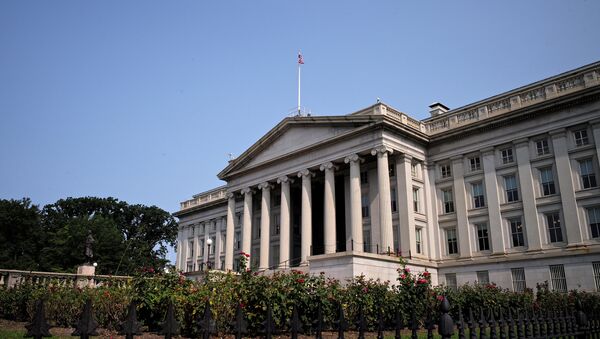Kristian Rouz — US Treasury Secretary Steven Mnuchin says his department might seek to update the existing global currency exchange framework in order to prevent FX rate manipulations in international markets. Secretary Mnuchin said such updates could arrive in the form of special provisions to US trade agreements with its major partners.
Talking to reporters during the International Monetary Fund (IMF) and World Bank meetings in Bali, Indonesia, Secretary Mnuchin said several major economies have been devaluing their currencies over the past few years in order to boost their competitiveness in international trade. Mnuchin said upcoming trade deals with countries such as Japan could include provisions to limit such practices.
"Our objective would be that the currency issues… We'd like to include (those) in future trade agreements. With everybody. I'm not singling out Japan on that," Mnuchin stressed.
Secretary Mnuchin's remarks come after several Trump administration officials criticized Mainland China for its alleged effort to devalue the renminbi — either directly or indirectly.
READ MORE: US Treasury Secretary ‘Won't Lose Any Sleep' Over China Selling US Bonds
Some economists have pointed out that Beijing might not seek to devalue its currency as its primary objective. However, the People's Bank of China's (PBOC) policies of loosening bank reserve requirements and pumping cash into the slowing economy are seen as exerting downward pressure on the renminbi.
In April, the Treasury moved to designate any country suspected of engaging in competitive devaluations as ‘currency manipulators'. However, the IMF said Mainland China's currency exchange rate does not appear to have been manipulated recently.
"According to our framework, the exchange rate of the renminbi is not out of line. It is broadly in line with the fundamentals," the IMF's Markus Rodlauer said during the meetings in Bali.
For its part, Japan's central bank has also pursued the policies of easy money, zero-to-negative interest rates, and bond purchases for almost a decade — causing a creeping devaluation of the yen, which has also supported Japan's exports.
In this light, Secretary Mnuchin's remarks stirred some anxiety in Japan. The yen's status as one of the world's reserve currencies could be in jeopardy, some investors say, if the looming US-Japan trade deal introduces a peg or a trading range limiting the dollar-yen fluctuations.
"If discussions on this subject become necessary, they will be made by the finance ministers of both countries," Japan's Economy Minister Toshimitsu Motegi said.
Over the past few years, Japan's economy has grown more quickly during periods of the yen's weakness against the dollar. However, the yen has a tendency to appreciate during periods of heightened concern in the global economy due to its reserve currency status.
While the Bank of Japan (BOJ) views the yen's reserve status as beneficial, sometimes investor demand for the yen has reflected negatively on the island nation's trade balance and GDP growth.
This might suggest Japan has some interest in limiting the yen's fluctuations against the dollar as well.
"We haven't had specific conversations on that. We obviously continually have conversations with my counterparts about currency. But that is the model we'd like to incorporate going forward," Secretary Mnuchin said.
Meanwhile, the Trump administration has also expressed its commitment to striking a trade deal with the UK once the Brexit process is complete in March 2019. In light of Mnuchin's statements, the Treasury might seek to establish a dollar-pound FX range as well — which might hold back Britain's growth in exports.
READ MORE: UK Gets Warm Welcome in Asia After Facing Cold Shoulder in Brexit Talks With EU
The US Treasury's proposal on an updated currency exchange regime might be based off the recently-concluded trilateral USMCA deal between the US, Mexico, and Canada.
Under the USMCA agreement, the signatories will share data on their international reserves and FX interventions on a month-to-month basis. This, officials believe, would allow full transparency in trans-border capital flows, and curb the possible competitive devaluations.
However, US officials haven't suspected either Mexico or Canada of manipulating their currencies — suggesting similar provisions in US-Japanese, US-British, or US-EU trade agreements could be far more detailed, and reach far beyond data disclosures.
If the existing system of free-floating exchange rates is indeed replaced by a new framework of bilateral currency exchange agreements, this might become the biggest change to the Bretton Woods system since the so-called Nixon shock.
Subsequently, such agreements could produce a new international monetary system to ensure a greater transparency in capital flows and reserve holdings of individual central banks.


